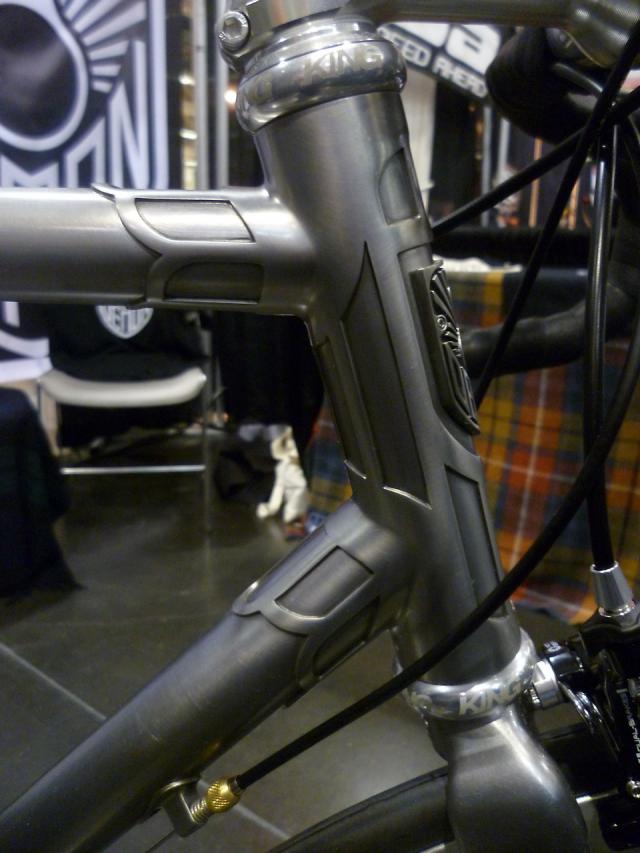While virtually the entire bike industry is on the way to Taiwan for the Taipei International Cycle Show, a very different group of guys capable of making bicycles all by themselves and growing considerably more interesting facial hair has just wrapped up another successful North American Handmade Bicycle Show. The contrast between the two shows is pretty striking and says something about the diversity of the bike industry. That seven dollar mass-produced kids’ bikes can exist under the same general umbrella as high-priced labors of love like Tom Warmerdam’s incredible Demon Frameworks bikes (above) seems somehow much more shocking than Bugattis and Dacias both being considered “cars.” We’re some diverse folk.
The trademark advantage of hand-built bikes over the big production brands is usually an emphasis on artistry and detail, unique aesthetic traits, while the big guys tend to own technology. Don’t get me wrong: Crumpton and company are doing some stunning things with carbon fiber, but the big guns naturally tend to be the innovators when it comes to materials and engineering. That’s because they’ve built companies geared toward selling enough product to raise capital that gets reinvested in new technology. While you can argue (convincingly) that they often waste that development money solving problems that don’t exist, or making all new problems, the big guys are driving the industry forward, and generally they get the job done and continue to improve bikes. Unfortunately, very little of this technological development goes on entirely within their walls.
Right now, the reality is that if you want bicycle technology, it’s impossible to avoid outsourcing production, especially to Taiwan or China, where bike manufacturing is–frankly–far more advanced and serious a business than it is in most other countries, including the U.S. More unfortunate is the fact that a small number of factories in Taiwan and China produce the majority of product like carbon fiber bicycle frames. Again, if they’re the best at it, more power to them but at some point (that most of you have no doubt noticed we’ve already reached) you begin to lose diversity from one mass-produced bike brand to another. For companies that haven’t even bothered to employ engineers and designers, you also cede design control, which means your marketing department can’t even distinguish your products from the competitions’ products. I know of multiple U.S. bike brands who are essentially shells for their respective Chinese factories, and it shows in their product bullet points. “High-modulus carbon fiber” is probably still the funniest, except for “ultra-high-modulus carbon fiber,” which is even funnier. There are bike companies in the U.S., for instance, that could not–for a million bucks–explain why their frames are shaped the way they are–I mean other than for “vertical compliance” and “torsional stiffness.”
I think it’d be really great if that wasn’t the case.
To be sure, some of the people at Handmade are choosing frame shapes based solely on what looks cool, which isn’t a particularly scientific approach, but at least the same person welding or bonding is the one making the call. And I think this has room to improve drastically over the next ten years.
Design and development innovations like 3D printing and Solidworks (which is surprisingly easy to use for thinking up designs and testing them, given how ridiculously powerful it is) are good signs, and suggest we might yet have a future in which, say, a small component manufacturer could design a viable suspension fork. Sure, the technology necessary to really empower more of us to make interesting and legitimate products is still probably a decade away (if it happens at all), but I’m hopeful. Given all the recent focus on the “new normal” American economy and the decline of the manufacturing jobs that created our middle-class, I think the best chance we have of becoming a leader in manufacturing in the future may come from high-tech DIY. We’re not there yet, and maybe we never will be, but how wonderful would it be to see a Hand Built show that included more complex technology? How great would it be for guys like Frank the Welder to be able to design and produce bikes using at least some of the same production technology as Specialized or Trek? Some interesting ideas tend to always find their way out into the world. The technology necessary to make that happen for bicycle is only getting better. What’s the future equivalent of Keith Bontrager’s dumpster diving? I’m hoping it’s out there.


Sorry, the comment form is closed at this time.